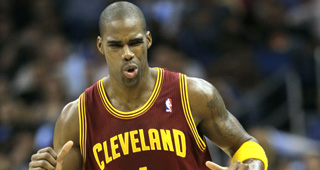A lot has happened since the Cleveland Cavaliers last won a game.
Their most recent victory was a significant one too, a 109-102 overtime triumph over the New York Knicks on Dec. 18. In that game Anderson Varejao grabbed 17 rebounds and Maurice Williams had 14 assists.
It has been 48 days since the Cavaliers have won a game. They’ve lost a shocking 22 straight, saving the Toronto Raptors, who have dropped 13 consecutive decisions, from a lot of negative attention.
Here’s a quick look at how the rest of the league has fared since Dec. 18.
San Antonio: 19-5
Chicago: 18-6
New Orleans: 16-9
Boston: 16-7
Miami: 15-7
Orlando: 15-10
Atlanta: 14-7
L.A. Lakers: 14-9
Denver: 14-9
Memphis: 14-9
Portland: 13-12
L.A. Clippers – 13-8
Oklahoma City: 12-9
Dallas: 12-10
Philadelphia: 12-10
Charlotte: 12-10
Golden State: 12-11
Houston: 12-13
Phoenix: 11-11
Utah: 11-12
New York: 9-12
Detroit: 9-13
Milwaukee: 9-15
New Jersey: 8-15
Indiana: 7-14
Sacramento: 7-15
Washington: 7-17
Minnesota: 5-16
Toronto: 3-20
Injuries
Before we look into the numbers behind Cleveland’s lengthy skid, which is one away from tying the NBA’s record for consecutive defeats, let’s get one certainty out of the way – injuries have played a major role in their struggles.
Williams has missed 11 of the 22 losses, while playing just five minutes in another. Daniel Gibson hasn’t played in ten of the games thanks in large part to a quadriceps injury. A bad back has kept Anthony Parker out of nine games. Worst of all, Varejao hasn’t played since Jan. 5 and has missed 16 of the 22 defeats.
Those injuries have forced Byron Scott to lean on a roster already depleted by the departure of LeBron James via free agency this past summer. In addition, expected rotation players like Christian Eyenga, Joey Graham, Leon Powe and Jamario Moon have missed considerable time.
Three Chances To Win
They have struggled to close out potential wins, such as Wednesday’s game at home against Indiana, and allowed teams to run away with relatively competitive contests in the fourth quarter.
The Cavaliers have lost by one (Dec. 26 vs. Minnesota), two (Jan. 24 at New Jersey) and five points (Feb. 2 vs. Indiana) during the streak.
Jamison hit a six-footer to give Cleveland a one-point lead with 10 seconds left against the Timberwolves, but Michael Beasley answered with a game-winner of his own. Beasley then forced Jamison to miss his own rebuttal.
Brook Lopez broke Cleveland’s heart with a game-winner with 1.4 seconds remaining in New Jersey’s two point win. The Cavaliers entered the fourth quarter of that game with a four-point edge.
On Wednesday night, Cleveland held a 108-105 lead over Indiana with 3:31 left. They trailed by only one point with 27 ticks left and had the ball, but Parker missed a running jumper. After Danny Granger made two free throws, J.J. Hickson turned the ball over.
They have to capitalize on opportunities like these as 15 of their losses have come by double-digits.
Struggles Feed Into One Another
The Cavaliers have been horrible defensively, somewhat surprising for a team coached by Scott, allowing a league-worst 112.3 points per 100 possessions. Opponents are shooting 47.8% from the field (28th) and 42.7% from three-point land.
Without Varejao their interior defense has taken a hit and Scott has feuded with Hickson about his defense, among other things. Cleveland’s perimeter defense is absolutely atrocious. The Timberwolves, which are allowing the second-highest three-point percentage, are more than four percent better at 38.5%.
To put things into perspective, there is a 4.2% difference between Minnesota and Cleveland, but just a six percent difference Atlanta (the league’s best three-point defense) and Minnesota.
Fundamentally, the Cavaliers have to do a better job rotating and closing out on shooters. They don’t foul a whole lot, which indicates a lack of physicality and open looks. Their opponents adjusted field goal percentage is 53.3%, which is, not surprisingly, last in the NBA.
Having the league’s worst defense is bad enough, but their inability to outscore teams has kept them out of the win column. A good offensive team can win on any given night, but the Cavaliers possess the league’s worst offense on top of it all. They score 99.9 points per 100 possessions. There are 11 teams that average more than 100 points per game, never mind per 100 possessions.
They get to the line a fair amount, but average just 1.16 points per shot (28th) and have an adjusting field goal percentage of 46.3% (29th).
Varejao would vastly improve their defense and rebounding, but he’s expected to miss the remainder of the season with an ankle injury. Williams would undoubtedly help breathe live into Cleveland’s offense, but he’s still at least away from the court as he recovers from a hip flexor.
When Might It End?
The Law of Averages will likely come into play at some point, allowing the Cavaliers to end their losing streak despite their injuries, inept offense and porous defense. Still, they are more likely to do so against another lottery hopeful than a title contender.
Cleveland’s best chances at a win will come Feb. 9 against Detroit and Feb. 13 against Washington. Of course, if the Cavaliers haven’t won by the time the Pistons arrive at the Quicken Loans Arena next Wednesday, they’ll have already lost an NBA-record 25 games in a row.
Thanks to the improved play of the Grizzlies, they’ll be sizeable underdogs in their next three games (at Memphis, vs. Portland and at Dallas). If they don’t beat the Pistons, they’ll have to face the surging Clippers before facing the middling Wizards.
A lot will depend on how they rebound from Wednesday’s close encounter with a victory, but here’s my prediction – they enter the history books with 27 consecutive losses before celebrating a win more than a week from now at home against John Wall and the Wizards.



